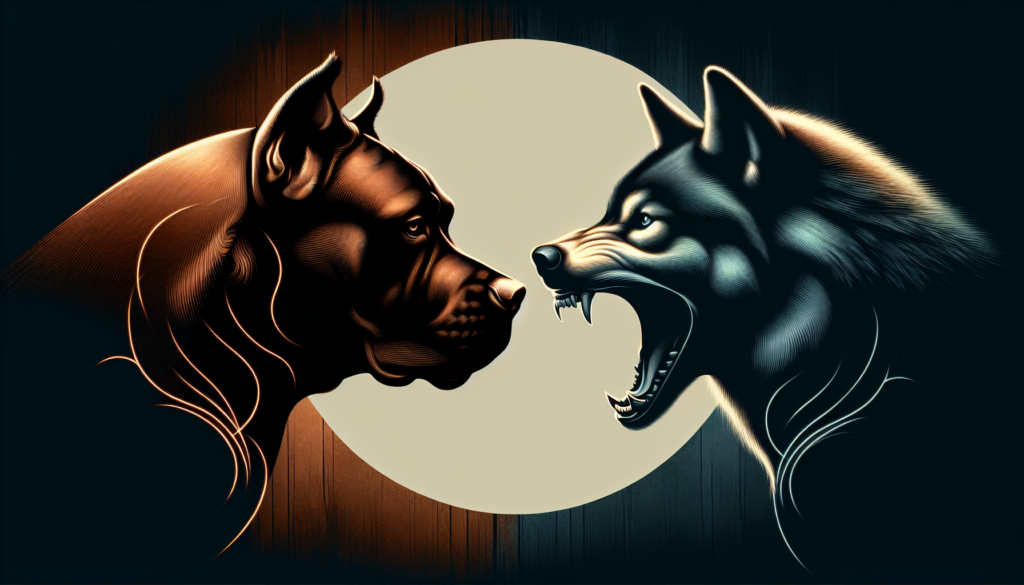Imagine the thrill of witnessing a fierce battle between two formidable creatures – a Cane Corso and a wolf. These majestic animals, known for their strength and hunting prowess, are about to come face to face in an epic showdown. As you ponder on the question of whether a Cane Corso can defeat a wolf, you find yourself drawn into a captivating debate, filled with passionate arguments and compelling evidence. Get ready to delve into the world of nature’s apex predators and discover the truth behind this captivating encounter.
Can a Cane Corso Defeat a Wolf?
An Overview of the Cane Corso and Wolf
The Cane Corso and the wolf are both majestic creatures in their own right. The Cane Corso, also known as the Italian Mastiff, is a powerful and muscular breed that has roots tracing back to ancient times. On the other hand, the wolf is an apex predator with a keen intellect and formidable physical abilities.
Physical Characteristics and Strength of a Cane Corso
The Cane Corso is a large and imposing breed. Males can weigh up to 120 pounds and stand up to 28 inches tall at the shoulder. They possess a well-built body and a strong, muscular frame. This breed’s impressive bite force can exert immense pressure, making it a force to be reckoned with. Additionally, their agility enables them to swiftly navigate various terrain.

Physical Characteristics and Strength of a Wolf
Wolves are known for their intimidating presence. They are larger than the Cane Corso, with males weighing between 80 and 120 pounds, depending on the subspecies. Their incredible speed, agility, and endurance make them exceptional hunters. Armed with powerful jaws and sharp teeth, wolves possess a bite force that can easily crush bones, enabling them to bring down sizable prey.
Understanding the Nature of Wolves
Before delving into the potential outcome of a confrontation between a Cane Corso and a wolf, it is essential to understand the nature of wolves. Wolves are highly social animals that live and hunt in packs. They have a complex hierarchical structure and rely on cooperation and teamwork during hunting. Their adaptability to various environments and ability to strategize make them formidable opponents.

Differences in Hunting Style
The Cane Corso has a rich history as a guardian dog, bred to protect livestock and properties. Their hunting style primarily involves chasing and capturing prey, making them excellent at apprehending intruders. On the other hand, wolves have evolved as efficient predators equipped with specialized techniques. They employ tactics such as stalking, pursuit, and ambush to isolate and overpower their prey.
Pack Mentality and Individual Capabilities
Wolves’ pack mentality is a significant advantage during hunts. Through meticulous coordination and communication within the pack, they can take down much larger animals. The strength lies not only in their individual prowess but also in their ability to work as a collective unit. In contrast, the Cane Corso relies on its individual strength and protective instincts to defend and deter threats.
The Importance of Size and Power
Size plays a crucial role in determining the outcome of a potential confrontation between a Cane Corso and a wolf. While a Cane Corso is a formidable breed, wolves often surpass them in size and physical power. The sheer size advantage possessed by wolves cannot be underestimated, as it provides them with the ability to overpower their opponents with greater force and endurance.
Cane Corso’s Protective Instincts
One of the qualities that makes the Cane Corso a popular choice as a guardian dog is its loyalty and strong protective instincts. They possess an inherent desire to defend their family and territory from any perceived threats. This protective nature coupled with their fearlessness makes them willing to confront potential dangers, including predators like wolves.
Training and Socialization of a Cane Corso
Proper training and socialization are essential for any dog breed, including the Cane Corso. Early socialization with different people and animals is crucial to help them develop appropriate behaviors. Training should focus on obedience, impulse control, and reinforcing the guardian instincts while ensuring they understand appropriate boundaries. A well-trained Cane Corso will be better equipped to handle potential confrontations.
Potential Scenarios and Outcomes
Encounters between a Cane Corso and a wolf are relatively rare, given the natural aversion of wolves towards human settlements. However, let us consider a few hypothetical scenarios. In an unlikely solitary encounter, the outcome would depend on various factors such as size, individual capabilities, and overall health. A healthy and well-trained Cane Corso may have a chance to defend itself against a lone wolf, but the odds would still be challenging.
However, when it comes to a pack of wolves, the odds overwhelmingly favor the wolf pack. The coordinated efforts and strength in numbers of a wolf pack are formidable, often outmatching the capabilities of even the strongest individual dogs. A pack of wolves would likely overpower a solitary Cane Corso, and the outcome would be highly unfavorable for the dog.
In some situations, a well-trained and assertive Cane Corso may serve as a deterrent, preventing a wolf pack from approaching human settlements. The sheer presence of a confident and protective dog may make the wolves reconsider approaching, valuing their safety over a potential confrontation.
In conclusion, while the Cane Corso is a powerful breed, the physical advantages and pack mentality of wolves generally make them a more formidable opponent. It is always important to prioritize the safety and well-being of both dogs and wildlife. Encounters between a Cane Corso and a wolf should be avoided whenever possible, and responsible pet ownership, including training and socialization, is crucial to ensuring the safety of your dog in any situation.
